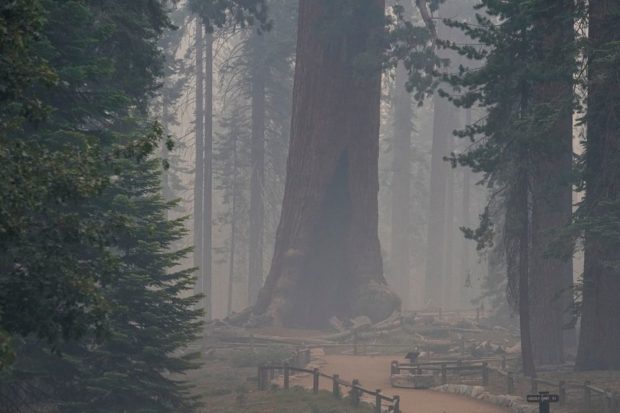Giant sequoias may benefit from fire in California’s Yosemite, official says

The Grizzly Giant, a giant sequoia in Yosemite National Park’s Mariposa Grove, is enshrouded in Washburn Fire smoke near Wawona, California, U.S. July 11, 2022. REUTERS
The fire in California’s Yosemite National Park may benefit some of the world’s oldest giant sequoias by helping release seeds and clear debris from the forest floor, preventing more severe blazes that could wipe out many of the massive trees, an official said on Tuesday.
The fire started on Thursday in the park’s Mariposa Grove, home to more than 500 mature giant sequoias, the largest tree species by mass. The trees have survived thousands of years despite regular fires touched off by lightning.
The low-intensity blaze, named the Washburn fire, likely killed a couple of younger sequoias growing in the southern part of the grove, said Stanley Bercovitz, a spokesman for the fire’s incident management team.
But it also incinerated scrub and dead trees that, if left unburned, fuel severe fires capable of torching larger sequoias more than 200 feet tall and about 3,000 years old.
Drought-fueled blazes in California’s Sierra Nevada range, the giant sequoia’s natural habitat, have wiped out up to 20% of the tree’s population in recent years, according to biologists.
Article continues after this advertisement“It was definitely beneficial,” Bercovitz said of the Washburn incident. “Fire in the right amounts, it’s very healthy.”
Article continues after this advertisementThe Washburn blaze mimicked natural fires that for millennia have produced enough heat to open cones without burning through the sequoias’ thick bark. In the process, soil is enriched with nitrogen from burned wood.
Yosemite officials have long used prescribed burns to remove a build-up of fuel caused by over a century of fire suppression.
The Washburn fire did not start naturally and its cause is under investigation, officials said.
By Tuesday morning, the blaze was 22% contained, having burned through 3,221 acres (1,303 hectares), according to the Inciweb incident information system.
The Mariposa Grove remained closed to visitors, while the rest of the sprawling park has stayed open.
California’s fuel-choked forests, combined with drier conditions linked to climate change, have created conditions for the eight largest wildfires in state history since 2017, according to California Department of Forestry Protectiondata.
RELATED STORIES
Firefighters start to contain blaze in California’s Yosemite
Yosemite wildfire smoke chokes national park’s views and air quality
Lessons from America’s national parks